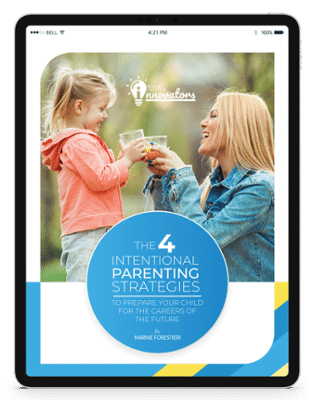When my son was young and just children learning how to be on the move, he was fearless. He tried anything, climbed with no regard to the dangers it posed, and explored wherever he pleased. But then he fell a few times and he learned fear.
While in this situation, fear is healthy. I was glad he wasn’t diving headfirst off of every toy and piece of furniture we owned. Fear can harm your child’s success later in life. As parents, our job is to cultivate healthy mindsets that promote life-long learning. But there’s no handbook for parenting, so we’re forced to learn right alongside our children.

To guide you in your efforts, here are the mindsets that we as parents can cultivate in our children. This promotes their ability to learn and ensures their success.
Growth mindset
In short, your mindset is how you view your talents and abilities. Children with fixed mindsets believe that failure is permanent. Fixed mindsets do not help children reach their full potential and rise to the challenge. Instead, you want to cultivate a growth mindset in your child. When children grow up with a growth mindset, they see failure as an opportunity to learn more and shift their understanding. A child who takes constructive feedback views it as a chance to improve. This is indicative of a child with a growth mindset. Those with fixed mindsets tend to see constructive feedback as an attack on who they are as a person.
Here are some practical steps to cultivating a growth mindset in your child.
- Model a growth mindset
make an effort to be less negative toward your everyday tasks. Instead of saying something is too hard, say that it is difficult for you. Express that you need to practice it more. This teaches children that it’s OK to struggle and that the solution to struggling is to work at it. - Use the word “yet” whenever you say “can’t”
instead of allowing your child to say that they can’t do something, tell them that they can’t do it yet. This praises and recognizes the process of children learning something new and leaves the opportunity for your child to learn it. - Avoid labeling your child or other children
when you tell your child that they are smart all the time, it allows them to think that they don’t have to try that hard. The same is true of talking about other people that way. Avoid labels to show children that anyone can grow and change. - Explain the inner voice to your child
self-doubt comes from within and it’s a little voice that parents can’t hear. We don’t know what kind of negativity is going on inside the brains of our little ones. Teach your child what that inner voice is and how to change those thoughts into positive ones.
Confidence mindset
To feel confident that they can try new things, children need praise. But not praise for the outcome of their success. As parents, we need to praise the process and effort that children put into something.
Instead of telling your children how smart they are, emphasize how hard they worked. Alternatively, highlight how well they problem-solved. This small change in how you praise your child will shift their mindset. They will have the confidence to try in other situations and opportunities.
When we tell our children that we see their efforts, it encourages them. Even when they struggle, and they do good work, it motivates them to put in effort in the future. Even when your child fails at something, you should be praising their effort. This helps them understand that failure isn’t always a bad thing. Confidence will motivate your child’s efforts in their future endeavors and help them to try their best in everything they do.
Try everything once mindset
I’m sure you’ve experienced a child who takes one look at a new food and knows they won’t like it. They haven’t tasted it for themselves yet but they are certain it won’t be good. That mindset is a dangerous one and one that doesn’t promote putting in effort to try new things. Teach your children that they should try everything at least once. Whether that is food or a new game on the playground. There’s no way to know if they will like something until they try it. Encouraging your child to put forth effort to learn more about how things work and what they are like will encourage them to try new things and discover hidden talents. This starts at a very young age. Just like adults, children are creatures of habit.
They like knowing that they like certain foods or enjoy specific activities. But there’s a danger there in only doing those things. As parents, we can help our children try new things by enrolling them in different activities, playing with new toys in the backyard, and shaking up routines from time to time. Encourage children to try new foods by cooking different types of cousins and using different ingredients and spices in your recipes.
Conclusion
Changing how you encourage your child and how you speak about your struggles might also alter how you view your success. As you work toward promoting healthier thoughts and enjoying the process of certain activities, you might find you enjoy putting in effort more as well. Your whole family can change with the right mindset and self-talk.
Remember that you are a role model and that your confidence, interest in putting forth effort, and how you talk about yourself will affect how your child talks about themselves. It’s never too early to start promoting these healthy mindsets in your children. So even when your babies and toddlers are exploring dangerous territory, remember to guide them to safety in a way that encourages them to still try new things. Your goal is to help them understand what activities will promote their lifelong success and to try those activities, at least once.























